6 Best Fruits for Your Blood Sugar—Ranked!
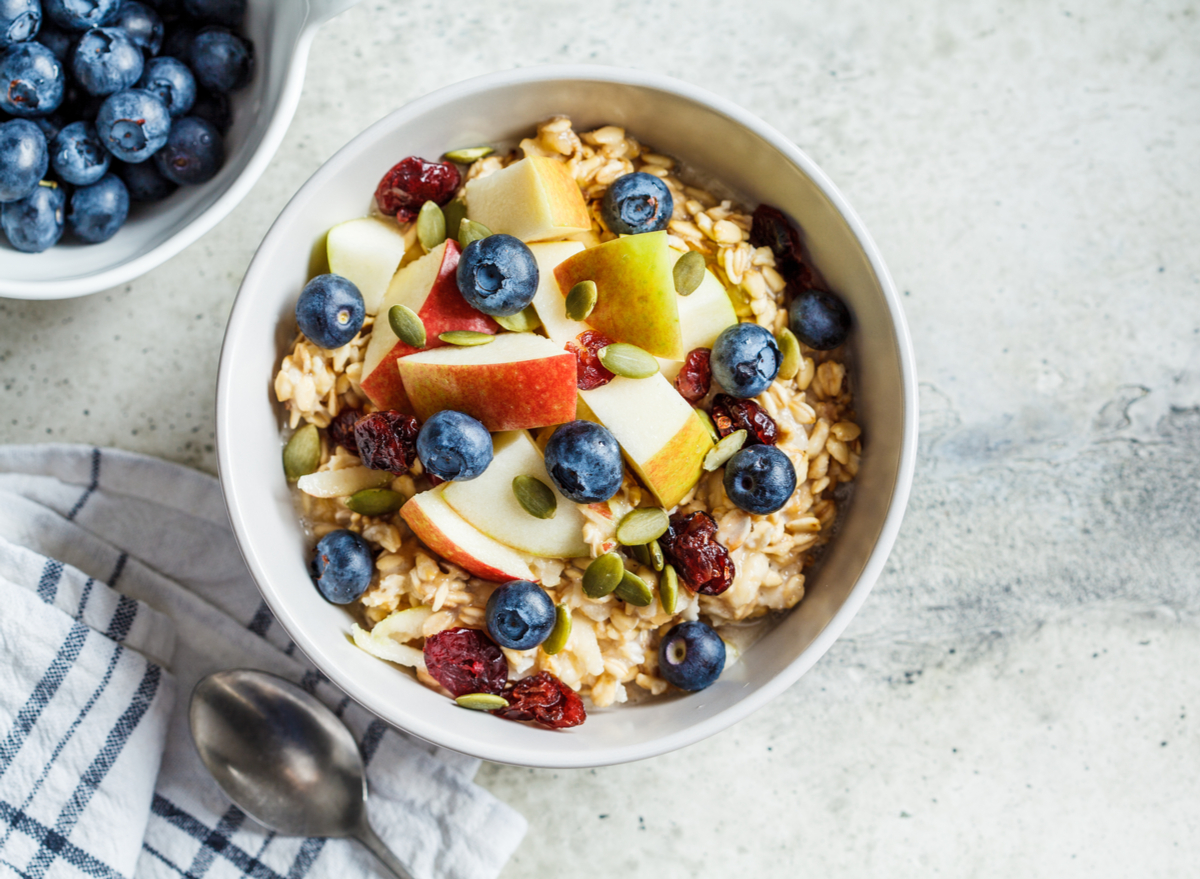
Fruit gets a bad rap when it comes to blood sugar control. Sure, many varieties of “nature’s candy” are natural sugar sources, but these foods also typically contain nutrients like fiber and important minerals that help support healthy blood glucose levels. In other words, eating fruit is not the same as eating candy when it comes to blood sugar control. You get far more beneficial compounds when you enjoy fruit as compared to classic added sugar-laden foods.
When selecting the best fruit for your blood sugar management, your best bet is to opt for those that contain fewer natural sugars, a boost of fiber, and are a source of natural minerals that may help control blood sugars, like magnesium and copper.
And if you really want to support your blood glucose levels, try pairing your sweet fruit choices with protein, fiber, and healthy fat—three nutrients that help slow the digestion of carbs and delay their absorption into the blood, ultimately helping prevent blood sugar spikes. So, a piece of fruit paired with a handful of walnuts or pistachios will serve you better than eating the same piece of fruit on its own. Plus, you may feel more satisfied after enjoying this combo too!
Finally, your fruit’s portion size should be considered when you are focused on supporting healthy blood sugars. While eating one serving of fruit at a time can be a part of a blood sugar-friendly meal or snack, eating massive bowls or multiple pieces of these foods can load your body with too much sugar at one time, resulting in a blood sugar spike. Keep your servings to an appropriate one medium piece of apple, banana, or pear, 1/2 cup of fresh fruit, or 1/4 cup of dried varieties.
While all fruit varieties can be a part of a healthy diet, there are some that top the list when it comes to supporting your blood sugar. Among the sea of fruits available at our grocery stores and local farmer’s markets, here are the top six best choices for your blood sugar—ranked from good to great! Read on, and for more, don’t miss 4 Eating Habits Secretly Increasing Your Blood Sugar, Say Dietitians.
Apples
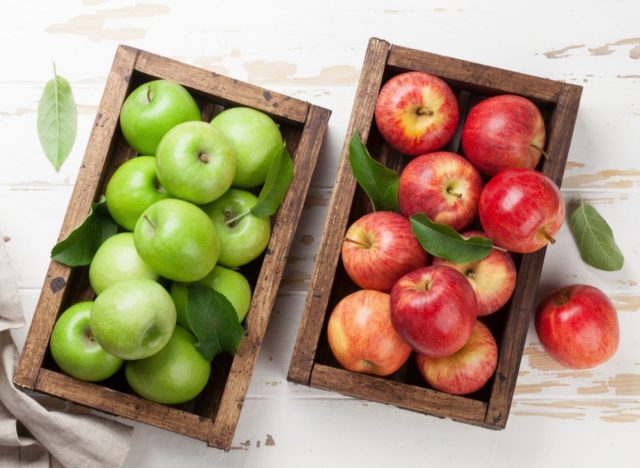
Biting into a crunchy apple will fuel your body with fiber and a variety of compounds, including quercetin and chlorogenic acid, which may help reduce blood sugar.
Results from a small study evaluating adult women showed that eating apples before a carbohydrate meal helped reduce blood sugars after mealtime.
One medium apple contains over 4 grams of natural fiber and under 20 grams of natural sugar. Pairing apple slices with a source of protein and healthy fat, like nut butter, can offer even more blood glucose control and may make your nosh even more satisfying too.
Pears
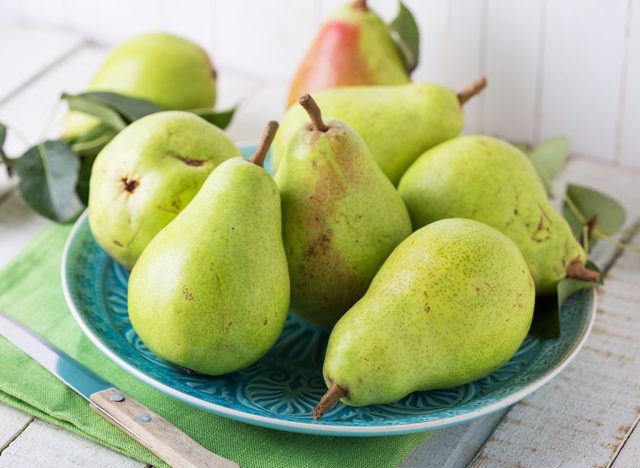
As long as you are eating the skin, eating pears can be a fantastic addition to a blood sugar-friendly diet. A medium-sized pear contains 6 grams of fiber, which equals about 21% of the recommended daily value. Removing the skin of the pear will result in less blood sugar-controlling fiber, as well as fewer micronutrients that help support glucose control, like vitamin C.
Blueberries
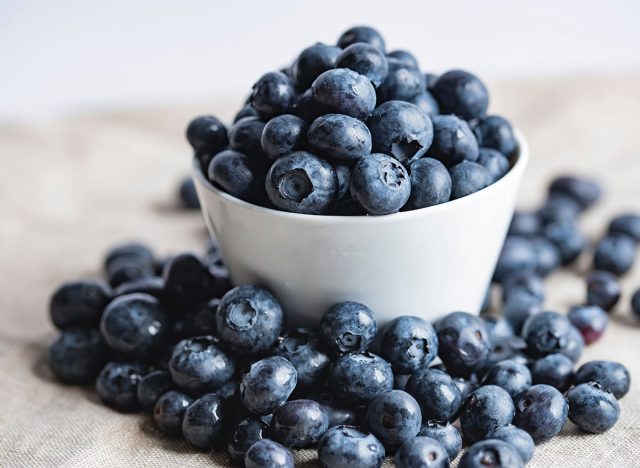
Blueberries are a beloved fruit that is a great topping for yogurt parfaits and oatmeal dishes. And data shows that eating these berries may help increase insulin sensitivity, ultimately supporting blood glucose control.
Among men with type 2 diabetes specifically, blueberry consumption improved health parameters like glucose and insulin management, based on data published in Current Developments in Nutrition. And recent data shows that, among sedentary individuals, eating blueberries improve glucose management and insulin levels.
Tomatoes
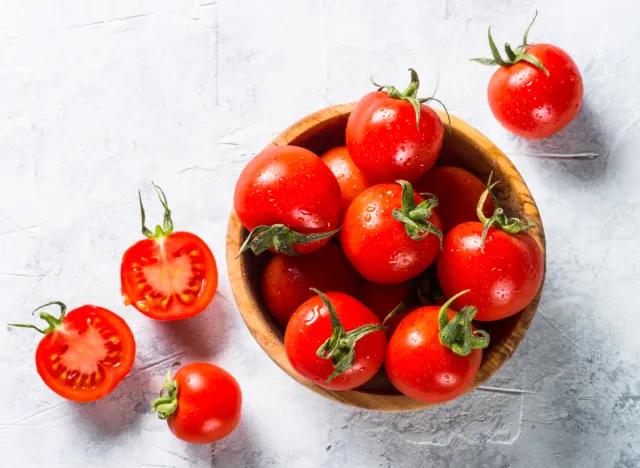
Don’t let the presentation of these red beauties fool you. While tomatoes are oftentimes served as a vegetable, because they are grown from a flower and they have seeds they are technically a fruit.
Tomatoes are naturally lower in sugar, with one cup of this fruit containing only 4 grams of this nutrient. Tomatoes also contain lycopene, a carotenoid that has the ability to decrease body glucose and raise insulin levels, although well-designed studies confirming this effect are needed.
As a source of fiber, including tomatoes in dishes may help manage blood sugars as well, thanks to the ability of this nutrient helping slow digestion once consumed. And the potassium naturally found in these summertime fruits may have a positive effect on insulin resistance.
Coconut
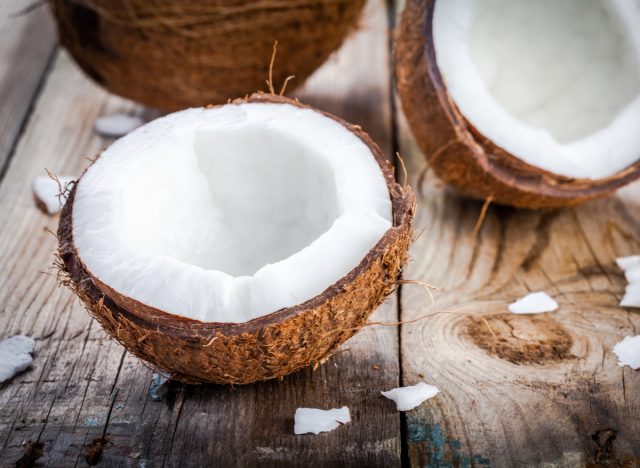
Enjoying coconut can add some unique and utterly satisfying flavor to many meals and snacks. And people who are trying to manage their blood sugars will delight in knowing that this tropical fruit is naturally low in sugar, containing only 5 grams per one-cup serving.
Coconut also contains fat and fiber, adding to the list of reasons why this fruit is a-ok when trying to manage blood sugar.
When choosing your coconut, avoid sweetened coconut flakes, which can be high in added sugar after processing. Instead, people should opt for fresh coconut meat, and in appropriate serving sizes. While coconut won’t significantly raise blood sugars, it does contain saturated fat, which is a variety of fat that should be consumed in limited amounts, especially for people who are at risk of developing heart disease.
Avocado
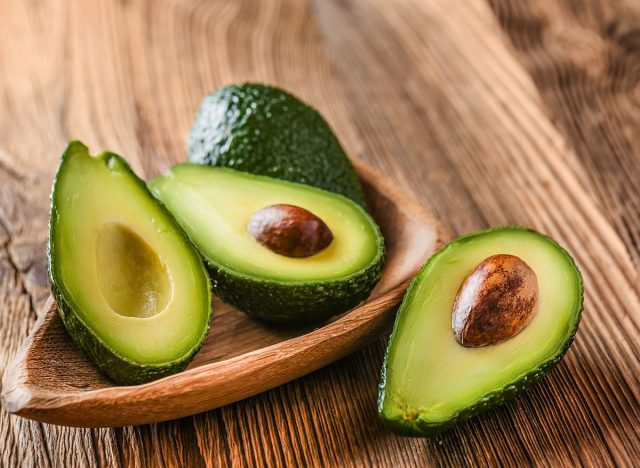
As if people need to be convinced to eat avocados, these creamy and satisfying fruits are incredibly low in sugar (1 gram per serving, to be exact), contain healthy blood sugar-supporting healthy fats and fiber, and are a natural source of magnesium, a mineral that promotes insulin sensitivity.
In fact, according to results of a clinical trial, partially replacing complex carbohydrates with monounsaturated fatty acids, like avocados, helps maintain adequate glycemic control, highlighting why including these healthy fats found in avocados is a healthy addition to a blood sugar-friendly diet.
When enjoying your avocados, keep in mind that this fruit is quite caloric, and eating too many calories may contribute to weight gain over time—an outcome that may contribute to blood sugar control challenges. As such, keep your avocado portion intake at a reasonable amount (ideally 1/3 of a medium avocado).









